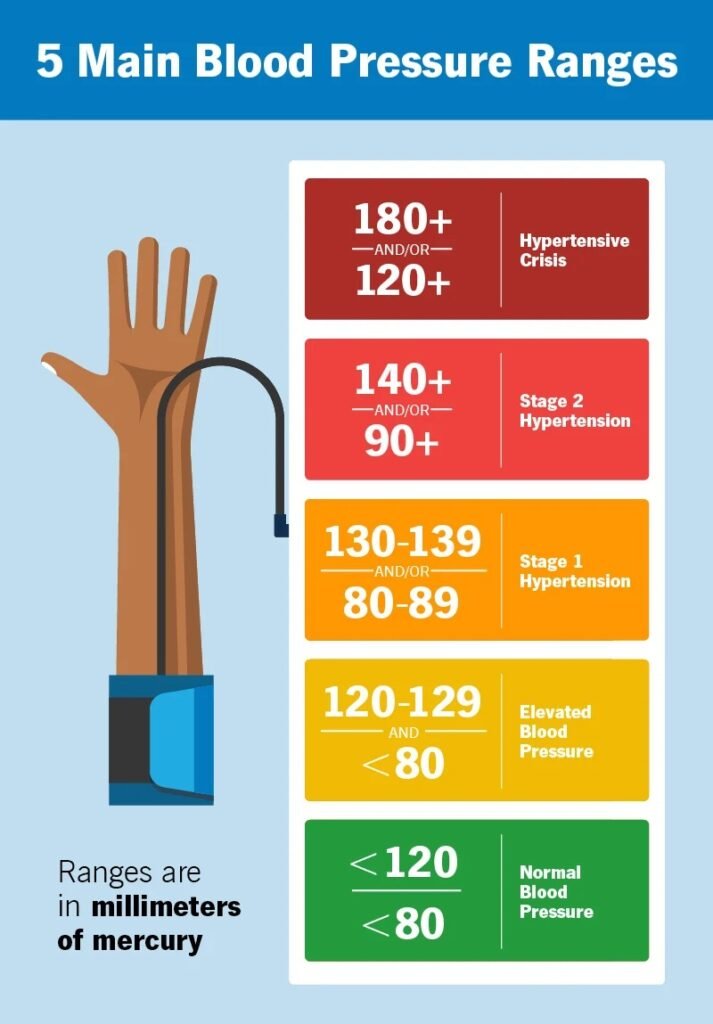
Understanding Blood Pressure: Blood Pressure Standards, Symptoms, Causes and Treatment of High Blood Pressure
Long-term high blood pressure (Hypertension) will increase the risk of heart disease, diabetes, stroke and other diseases. Especially when there are no obvious symptoms in the early stage of the disease, patients often have to wait until the symptoms of diseases caused by high blood pressure appear before they realize that they are also hypertensive. . “Hello Doctor” will analyze high blood pressure in this article and understand high blood pressure from various aspects such as definition, causes, symptoms and prevention.
High blood pressure definition
What is blood pressure?
Blood pressure is the pressure exerted on the walls of arteries when blood flows. The pressure when the heart pumps blood into the arteries produces systolic blood pressure (Systolic). When the heart relaxes, the pressure when blood flows back is called diastolic blood pressure (Diastolic). These two represent the pressure that blood vessels bear when the heart relaxes and contracts respectively. Changes in pressure create high blood pressure and hypotension (Hypotension).
There are roughly two main reasons that affect blood pressure changes. One is the amount of blood pumped by the heart. The more blood sent out with each heartbeat, the greater the pressure the blood vessels have to bear; the other reason is the diameter of the arteries. Atherosclerosis, which we often hear about, is a disease symptom that causes blood vessels to become blocked and narrowed, which often leads to heart diseases such as coronary artery disease.
Causes and types of high blood pressure
The causes can be divided into the following two types:
- Essential hypertension: Also known as essential hypertension, the cause is still unclear and may be related to heredity, living habits, and stress. Most patients with hypertension fall into this type.
- Secondary hypertension: Also known as secondary hypertension, this type of hypertension tends to occur suddenly, resulting in an increase in blood pressure that is usually more serious than primary hypertension. Possible disease and drug factors are as follows:
- Obstructive sleep apnea (OSA)
- thyroid problems
- congenital vascular problems
- kidney problems
- adrenal gland tumors
- drug
- poison
- Obstructive sleep apnea (OSA)
In addition, there is also a type of “white coat hypertension” (White coat hypertension), which refers to the patient’s blood pressure rising due to anxiety and stress when in the hospital or having a doctor measure the blood pressure, but not in other environments. specific symptoms that may occur.
Symptoms of high blood pressure
For most people, high blood pressure often has no symptoms. Only a few patients may have symptoms such as headache, difficulty breathing or shortness of breath, and nosebleeds. However, the symptoms of high blood pressure are usually quite severe at this time, not to mention that these symptoms are also serious. It is easy to be regarded as caused by other diseases, or even ignored by patients. Therefore, the only way to know whether you have high blood pressure is to measure your blood pressure regularly.

When should you seek medical help?
First of all, you must start by establishing a regular habit of measuring blood pressure. The Ministry of Health and Welfare recommends that people maintain the habit of measuring blood pressure at least once a year after reaching the age of 18. If the blood pressure reading is lower than 120 millimeters of mercury (mmHg) for systolic blood pressure and 80 mmHg for diastolic blood pressure, it is within the standard value. If the measurement results show that you are already pre-hypertensive or have high blood pressure, please see your doctor to discuss how to improve your high blood pressure and continue to track your blood pressure changes.
In addition, the blood pressure readings measured by the left and right hands may be different. Please use the arm with the higher reading as the main measurement arm and basis for judgment.
Risk of high blood pressure
Because high blood pressure has few symptoms, if you find yourself at risk for many of the conditions listed below, remember to get your blood pressure checked and make improvements. High blood pressure not only places a burden on blood vessels, but also affects organs such as the brain, kidneys, and eyes, increasing the chance of other complications.
- elder
- Race (blacks are more likely to have high blood pressure)
- family history
- smokes
- drinking
- pressure
- lack of exercise
- obesity
- Too much sodium intake
- Too little potassium intake
- Chronic diseases, such as diabetes and kidney disease
- Autoimmune diseases, such as lupus erythematosus
- Pheochromocytoma
- Thyroid disease
- Pregnant
Everyone knows that older people are prone to high blood pressure, but high blood pressure also exists in children. According to the Mayo Clinic, children younger than 6 years old may develop secondary hypertension due to kidney disease or heart disease, and children older than 6 years old may develop secondary hypertension. Children, like adults, may suffer from essential hypertension due to unhealthy diet or lack of exercise.
How to diagnose high blood pressure
Some people may not know which department they should see for high blood pressure. In fact, family medicine, general internal medicine and cardiology are all acceptable. Measuring blood pressure is the main way to determine whether you have high blood pressure. Whether it is measured with the help of a doctor or medical staff, using a blood pressure monitor placed in a hospital for public use, or purchasing a blood pressure monitor yourself and following the instructions for use. operate.
Depending on the situation, the doctor may use 24-hour ambulatory blood pressure monitoring (ABPM), or measure blood pressure at home and make a blood pressure record sheet to facilitate judgment of the condition.
In addition to measuring blood pressure, your doctor may also perform the following tests to confirm whether there are risks or signs of heart disease:
- blood test
- Urine test
- cholesterol check
- Electrocardiography, ECG or EKG
- Echocardiography
Complications of high blood pressure
- Myocardial infarction (or heart attack)
- Stroke
- Heart failure
- Metabolic syndrome
- Dementia
- Peripheral arterial disease
- Aneurysm
- kidney disease
- eye disease
Treatments for high blood pressure
Doctors will develop a unique course of treatment based on each person’s physical condition, blood pressure, and other risk factors. The following is a list of drugs that may be used to treat high blood pressure:
- Angiotensin Converting Enzyme Inhibitors (ACEI)
- Thiazide diuretics
- Angiotensin Receptor Blocker (ARB)
- Calcium channel blocker (CCB)
Usually, the above-mentioned drugs are used first. If the effect is not good, the following drugs may be considered:
- β-blocker
- α-blocker
- αβ-blocker
- Aldosterone antagonist
- Renin inhibitor
- Vasodilators
- Central-acting agents
High blood pressure care and nutritional supplements
After seeing a doctor, patients with high blood pressure should take medication according to the doctor’s instructions. They should not stop taking medication on their own if they feel their condition has improved, and they should return for regular check-ups to keep track of their blood pressure status. In addition, a healthy diet and more exercise can also help control high blood pressure. For complete methods, please refer to Hypertension Prevention Methods.
In addition, taking nutritional supplements such as folic acid may also help improve high blood pressure, but please discuss with your doctor before considering taking them to avoid them interacting with the medications you are taking and causing harmful side effects. The following are possible Nutritional supplements to consider:
- fiber
- folic acid
- Minerals
- Omega-3 fatty acids
- Coenzyme Q10
- L-arginine
- garlic
- How to prevent high blood pressure
How to prevent high blood pressure
In addition to drug treatment, improving lifestyle is also an important part of treating high blood pressure. For people without high blood pressure, the following methods can help prevent the occurrence of high blood pressure. If you are a patient with high blood pressure, you need to take relevant actions to reduce the harm caused by high blood pressure.
A good lifestyle includes:
- Measurement of blood pressure
- regular exercise
- quit smoking
- Don’t drink excessively
- relieve stress
- Reduce caffeine intake
- Practice deep breathing to relax
- healthy diet
- Weight control
When should you take your blood pressure? How many times do you need to measure? Understand the “722” blood pressure measurement principle
People over 18 years old should measure their blood pressure at home at least once a year, and follow the 722 principle:
“7”: Measure for 7 consecutive days.
“2”: Measure once each after getting up in the morning and before going to bed at night.
“2”: Measure blood pressure 2 times each time, with at least 1 minute interval in between.












